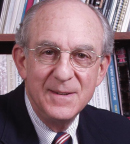Addressing disparities of cancer care that result in poorer outcomes among certain populations remains a persistent challenge in the oncology community and in the health-care system at large. It is, to a large degree, a medical story of haves and have-nots. Richard “Buz” Cooper, MD, a preeminent voice on disparities of care and our imminent shortfall of physicians, died on January 15, 2016, from pancreatic cancer. He was 79.
Dr. Cooper was an oncologist-hematologist for more than 50 years and through that journey, he rediscovered the essential role of professionalism in health care and the central importance of poverty in the growth of health-care spending, a subject that largely informed the last stage of his career.
His Early Career
Dr. Cooper’s early career was elevated and shaped by working at the National Cancer Institute (NCI) in 1963, when Drs. Emil Frei and Emil J Freireich first began using combination chemotherapy to treat childhood acute leukemia. “It was an extraordinary experience to see these children with a heretofore fatal disease respond to this first-time-ever treatment. It was truly a remarkable time in oncology, and I wanted to be part of it,” Dr. Cooper told The ASCO Post in an interview last year.
After his time at the NCI, Dr. Cooper finished his hematology fellowship at Boston City Hospital. In 1971, he went to the University of Pennsylvania and started a hematology/oncology program. Taking an innovative approach, Dr. Cooper—whose principal interest was in expanding the nation’s cancer infrastructure—gathered his team and resources and developed a cancer center attached to the university, which broke the mold of the freestanding cancer centers preferred by the NCI. Dr. Peter Nowell, who discovered the Philadelphia chromosome, assumed the director’s mantle for the first years; then Dr. Cooper took over and developed the center into a nationally recognized multidisciplinary cancer institute.
Work in Public Health
The next period of Dr. Cooper’s career was transformative and, in part, informed his work in public health. A native of Milwaukee, Dr. Cooper served as Dean and Executive Vice President of the Medical College of Wisconsin in Milwaukee from 1985 to 1994, where he later founded the school’s Health Policy Institute in 1994.
During the Clinton administration’s health-reform initiative, a startling observation emerged: We were heading for a surplus of 100,000 doctors by 2000. According to Dr. Cooper, this projection would reduce the recruitment of students into medical school and drastically cut residency programs, causing long-term reductions in America’s physician force.
To Dr. Cooper, the danger to the health system posed by the surplus projection, which he found glaringly wrongheaded, was obvious. Dr. Cooper took action. He applied the U.S. Census Bureau’s updated projection of population growth with the existing projections of physician growth based on the numbers coming out of medical schools, currently working, and those retiring. “The administration’s projection of a surplus of doctors by 2000 was wrong. Instead, we were on track for a dangerous shortage of doctors,” Dr. Cooper told The ASCO Post.
“My findings caused an outrage. But there were nuances that the administration was missing. For instance, at one point, lung cancer was virtually untreatable, so of course you didn’t need lung cancer specialists. But advances in detection and treatment fostered a need for more oncologists to treat that and other diseases. We needed more doctors, not fewer.”
In 2009, Dr. Cooper was called to testify at a Senate hearing on the need for innovative models in health care, which was, in part, a subtle call for a reduction in physician services. He explained to the Senate committee, “This problem will have to be addressed in two ways…by expanding the capacity to train more physicians…and through innovative practice arrangements among physicians and between physicians, hospitals, and nonphysician clinician providers.”
Dr. Cooper further commented that along with the erroneous statistics used to project a surplus of physicians, the government-driven agenda claimed that addressing waste and inefficiency would ameliorate the need for more doctors and services. Although Dr. Cooper agreed with health-policy experts that there was substantial waste and inefficiency in the health-care system, he contended that it was economic disparity in care, and not physician practice patterns, that drove overutilization of health-care services.
He stressed that poorer people, for a number of socioeconomic reasons, are less healthy than economically stable or affluent people and therefore cost more to treat. “There is abundant evidence showing that poverty is strongly associated with poor health status, greater per capita spending, more hospital readmissions, and poorer outcomes. It is the single strongest factor in geographic variations in health care and the single greatest contributor to excess spending,” Dr. Cooper told The ASCO Post.
The Later Years
Until shortly before his death, Dr. Buz Cooper was Director of the Center for the Future of the Healthcare Workforce and a Senior Fellow in the Leonard Davis Institute of Health Economics at the University of Pennsylvania. He shared an Upper East Side apartment with his wife, Barrie R. Cassileth, MS, PhD, the former Laurance S. Rockefeller Chair in Integrative Medicine at Memorial Sloan Kettering Cancer Center.
Dr. Cooper believed in the calling of medicine as a central force to heal and assuage suffering. He proved analytically that this nation needs more doctors, not fewer, if we want to deliver high-quality cost-effective medical care as our aging population grows.
His firmest message was that poverty was the main driver of health-care costs. And he made that very clear in his soon-to-be published book titled Poverty and the Myths of Health Care Reform (Johns Hopkins University Press)—a must read for doctors and policy makers who believe, as Dr. Cooper did, that we cannot separate medicine from social justice. ■


